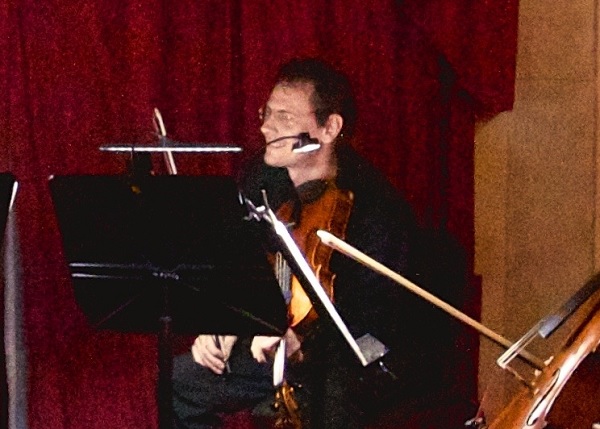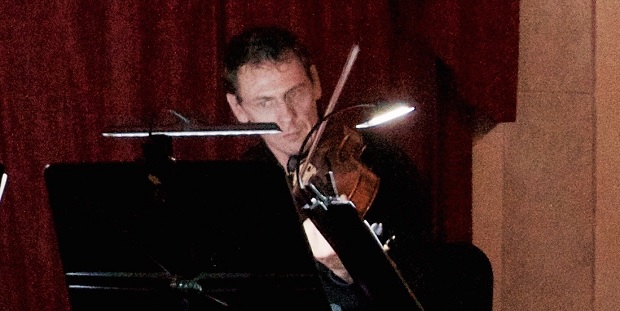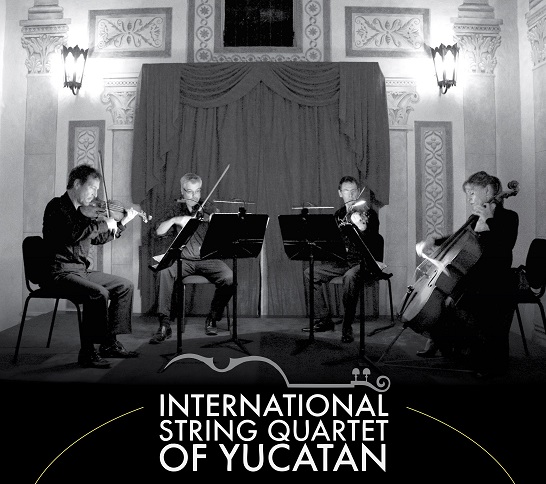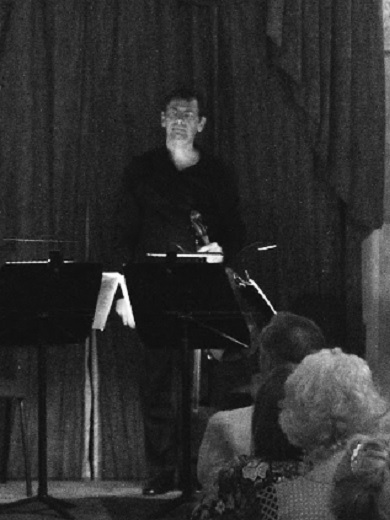The Yucatan Times finishes its series of exclusive interviews with the members of the International String Quartet of Yucatan. On this ocassion we conducted a revealing interview with Nikolai, the last (but not least) member of the Quartet.
Hello, can you tell us your full name and where are you from please?
Hi, my name is Nikolai Ivanov Dimitrov. I am a Bulgarian by birth, although I actually have Russian blood from my mother’s side of the family, and on my father’s side, my grandfather was Bulgarian and my grandmother was from Poland. I speak both Bulgarian and Russian since childhood.
When did you start studying music?
Well, ever since I remember I have been studying music. My mother told me that when I was very young, they took me to the opera, and when I saw the violinists and violists I said: “I want to play that instrument”.
So from the age of 4 or 5, my parents bought my first violin, and so I started to play from a very early age.
Did you go to a music school?
Well, in Bulgaria there was a musical education as part of the study system.
I lived in Bulgaria during the time of the Soviet socialist block, and therefore there were no private schools, all schools were run by the government.
I have noticed that there are several Bulgarians of my generation and even of previous generations who are “concertinos” (concertmasters) of important orchestras around the planet.
As in Gewandhaus the concertmaster is Bulgarian. As well as in renown symphonic and philharmonic orchestras such as Vienna or Berlin, which are some of the most important in the world.
(Gewandhaus Orchestra (Gewandhausorchester, also previously known in German as the Gewandhausorchester Leipzig) is a German symphony orchestra based in Leipzig, Germany. The orchestra is named after the concert hall in which it is based, the Gewandhaus).
When I entered the school of higher education in Bulgaria, I had been playing the violin for about 10 years already, but at that moment I decided that my instrument would be the viola.
What is the difference between the violin and the viola?
The viola is a string instrument, just like the violin. However, it has a slightly larger size and its sound is more serious. This instrument is considered as the tenor of the violin family.
One of the few tips my father once gave me was: “There are a lot of violinists in the world, but there are not so many violists. Among the violinists you can be a great violinist, but among the violists you can become an exceptional violist.”
In fact, I did not want to dedicate myself to the viola at first, since many people say that failed violinists become violists, but I do not believe that.
But you made the decision to dedicate yourself to the viola for yourself?
It took me quite some time to listen and discover how beautiful you can get to play with a viola. That deep sound, soft and at the same time very hot. It does not sound as cold as the violin. Although the violin can also sound very sweet, but it is a sound a bit more sharp. So I listen to it today.
I studied at the Sofia National Music School in Bulgaria, which is a Conservatory, and the most important music academy in that country.
After finishing my studies I started to work, and my first job was precisely playing in a chamber orchestra in a city of Bulgaria, near Sofia. In fact, I have never mentioned this orchestra in my resumes.
Later, I worked playing music in plays. That’s how I began to get used to playing in public, and I learned to overcome the scenic panic.
And when did you start to play in symphonic orchestras?
In the first symphony orchestra I played was a youth orchestra; even though I had already finished my conservatory studies, I joined this youth orchestra. And I was playing there until I came here.
Although I also traveled for a while to Morocco and played in the Royal Gendarmerie Orchestra in that country. This was my first experience working outside Europe, in a country totally unknown to me. There I had to practice my French, otherwise I could not communicate with people.
How many languages do you speak?
Well I speak Bulgarian, Russian, Spanish, English and French, although my French could improve a lot, but I can make myself (understood).
How did you get here to Yucatan, did some acquaintance call you?
Yes, the first director they hired to direct the symphony orchestra of Yucatan. This was 15 years ago and I was one of the pioneers in this orchestra.
Time passed, and I learned Spanish, although I had spent some time in Spain and had learned some words there, here in Yucatan where I finally learned 100 percent. Maybe it helped me to have studied some Italian and French.
Now you speak Spanish very well
Thank you, I have some things to improve but I already speak it quite well, besides I speak it everyday at home since my wife and daughter are Mexican.
My wife is from Xalapa, Veracruz and also is dedicated to music, she is also a member of the Symphony Orchestra of Yucatan, so we met. Her instrument is the flute. And thanks to her and to our little three year old daughter I have been able to practice and improve my Spanish.
What can you tell us about the International String Quartet in Yucatan?
The project was born in conversations that I had with the person who previously managed the quartet.
The idea was to form the quartet, as there was no serious chamber music project in Merida, Yucatan. There were sporadic things, but nothing like it is today.
What was wanted was a chamber music group not dedicated to play at weddings, quinceañeras or parties, but periodic presentations as a formal musical group. Now the project is in a new stage and the members are very well coupled and with a good track record.
At some point it was thought that there should at least one Mexican member in this group, but in reality although the four of us are from different countries, this group is Mexican, and rather Yucatecan, since it was here in Yucatan where the project was conceived, born and developed.
It is wonderful that the quartet can play more often now, and I personally would like us to have more presentations not only in Merida, but also in other towns in the state of Yucatan, and why not, in other places in Mexico as well.
When I have gone on tour to villages in Yucatan with the symphony orchestra, people always ask us: “Why do not you come more often?” There is a perceived demand for musical and cultural events that is not satisfied.
Do you think classical music is elitist in our state? Yes, I think so, I think people deserve that both the quartet and the symphony orchestra should tour the towns of Yucatan more often.
This should be done as a social work, to spread the culture and make it available to all people. Although people can not pay the price of a ticket like the people who attend the Peón Contreras weekends, they deserve to have access to this part culture that should be available to all people.
Thank you very much Nikolai.
Thank you.
For more information go to: http://www.isqy.mx/
Check out the interviews with the other three members of the International String Quartet of Yucatan:
Tim Myall: a lifetime “enjoying the musical life”
From Russia with love: cellist Nadia Golubeva makes Mérida her home
Renowned violinist who calls Merida home invites public to ISQY concerts
Interview by Alejandro Azcárate for The Yucatan Times







Comments are closed.